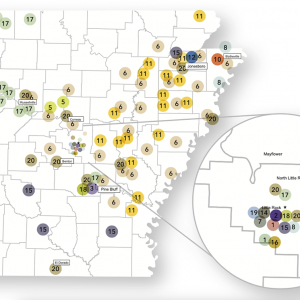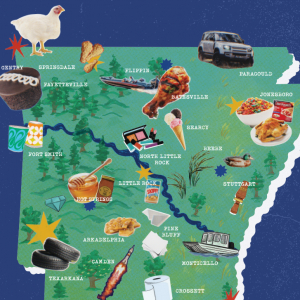Booming Arkansas Industry: Agriculture
By Arkansas Next on Friday, October 13, 2023

Agriculture by the Numbers
► 243,165 - total number of agri jobs in Arkansas in 2022
► Crops Planted In Arkansas In 2022
- Soybeans - 3,180,000 acres planted
- Rice - 1,106,000 acres planted
- Corn - 710,000 acres planted
- Cotton - 640,000 acres planted
- Hay - 1,093,000 acres harvested
- Wheat - 220,000 acres planted
► Agriculture/forestry use more than 97% of Arkansas' land resources
- 13.8 million acres of farmland
- 7.8 million acres of crops and hay
- 8.3 million acres of livestock
- 19 million acres of forest
► Arkansas Agri Rankings
- 1st - Arkansas is the No. 1 producer of rice in the U.S.
- 3rd in cotton production
- 3rd in broilers and turkeys raised
- 4th in catfish production
- 5th in timber production
- 8th in egg production
- 10th in soybean production
► 41,900 farms statewide
► 334 acres average size of an Arkansas farm
► 97% of Arkansas farms are family-owned
► Big Names, Big Businesses
- Walmart — the largest food retailer in the world
- Tyson Foods Inc. — The largest poultry and meat processor in the U.S.
- Riceland Foods — The largest rice exporter in the U.S.
(Sources: Arkansas Grown by the Arkansas Department of Agriculture, arfb.com, agriculture.arkansas.gov
Meet The Pros
More Jobs in Agriculture
| Trade | What They Do | Education Level Needed | Median Salary in AR |
|---|---|---|---|
| Agricultural Equipment Operators | Operate agricultural machinery, like tractors, combines, plows, sprayers and irrigation systems. | On-the-job training | $37,780 |
| Agricultural Inspectors | Inspect farms, agricultural products, processing facilities, and equipment to ensure guidelines are being met. | Associate degree or higher | $44,720 |
| Veterinary Technicians | Assist veterinarians, perform medical procedures, and diagnostic tests, help with X-rays and more. | Technical certificate or associate degree | $30,000 |
| Farm Buyers and Purchasing Agents | Responsible for getting the necessary equipment and supplies needed for agricultural operations (like seeds, machinery and fertilizers). | Associate degree or higher | $52,410 |
| Conservation Scientists | Examine plants, animals, soil and water to figure out how to take care of them and recommend conservation practices. | Associate degree or higher | $64,460* |
| Environmental Engineering Technicians | Collect data, conduct tests, and maintain equipment to make sure air, water and land are safe to use. | Associate degree or higher | $40,400 |
| Farmers, Ranchers and Agricultural Managers | Run the farm/ranch; make decisions about what to grow, when to harvest and how to keep everything healthy. | High school diploma or equivalent | $50,650 |
| Supervisors of Farming, Fishing and Forestry Workers | Work for farmers/ranchers but supervise agriculture worker teams—assign tasks, monitor progress, ensure safety protocols are followed. | High school diploma or equivalent | $47,790 |
| Food Scientists and Technologists | Like a chef who's also a scientist; make food better, safer and last longer by studying ingredients and cooking methods. | Associate degree or higher | $82,490 |
| Forest and Conservation Technicians | Maintain natural resources and managing ecosystems; collect data on forest conditions, monitor wildlife and help with conservation; work on wildfire prevention, reforestation and public education. | Associate degree or higher | $46,950 |
| Agricultural Engineers | Use science and technology to make farming better; create tools, machines and systems for farmers to grow more food, use fewer resources and protect the environment. | Bachelor’s degree | $83,260* |
| Fallers | Cut down trees using tools and techniques that ensure safety of people, other trees or surroundings. | High school diploma or equivalent | $39,310 |
| Vegetation Pesticide Sprayers and Applicators | Use special tools to spray plants with chemicals that protect them and help them grow stronger and better. | High school diploma or equivalent | $34,210 |
*Median salary in the U.S.; Arkansas median unavailable (Source: bls.gov)
















